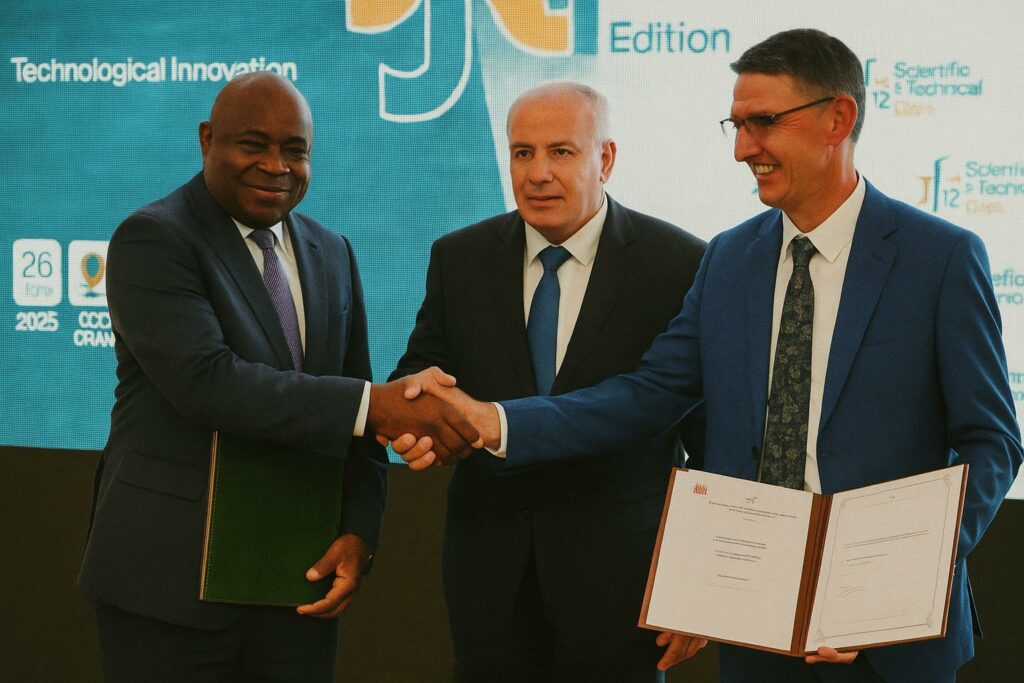Diplomatic Pedagogy Meets Hydrocarbon Realpolitik
On 24 June in the Mediterranean port city of Oran, an ostensibly modest signing ceremony drew unusually keen attention from African energy observers. Maixent Raoul Ominga, chief executive of the Société Nationale des Pétroles du Congo, endorsed a training convention with the Algerian Petroleum Institute that will dispatch 19 Congolese students into a five-year engineering curriculum supervised by the University of M’Hamed Bougara in Boumerdès. While the headcount is small, the symbolism is sizeable: two state oil champions—Congo’s SNPC and Algeria’s Sonatrach—are translating hydrocarbons cooperation into educational statecraft at a moment when both governments face a dual imperative of sustaining production and preparing for an inexorable energy transition.
The accord materialised on the margins of Sonatrach’s twelfth Scientific and Technical Days, themed “Energies of Technological Innovation.” By nesting the announcement within a research forum, the parties underscored that human capital is now the prized variable in Africa’s energy calculus. As Ominga reminded reporters, “our reservoirs count for little if we lack the engineers to read them.”
A Pan-African Classroom in Boumerdès
Founded in 1965 to feed Algeria’s newly nationalised oil and gas sector, the Algerian Petroleum Institute (IAP) has quietly become a continental magnet. According to data released by the Algerian Ministry of Energy in March 2024, more than 1,400 foreign students—primarily from sub-Saharan Africa—have graduated from IAP in the past decade. The Congolese cohort will join peers from Nigeria, Chad and Mozambique in laboratories that reproduce Sonatrach’s upstream workflow, from seismic imaging to LNG process simulation.
Congolese officials concede that domestic alternatives are limited: the Marien Ngouabi University in Brazzaville offers petroleum geology, yet lacks pilot plants and offshore drilling simulators. A 2022 African Development Bank assessment placed Congo’s technical skill gap in hydrocarbons at 38 percent of industry demand, a bottleneck that routinely nudges the government toward expatriate contractors. By leveraging Algeria’s training infrastructure, Brazzaville hopes to indigenise expertise and capture a larger share of service-sector value once its emergent LNG projects mature.
Sonatrach–SNPC: From Pipelines to People
The educational memorandum supplements a broader framework initialled in November 2023, under which Sonatrach has already hosted 49 SNPC employees for short courses on reservoir management, HSE compliance and refinery turnaround. Interviews with Sonatrach executives at the Oran event suggest the partnership is moving toward a standing ‘African Energy Campus’ model that could pool trainees from multiple national companies, a notion that dovetails with the African Union’s Agenda 2063 call for centres of excellence in strategic sectors.
Technical collaboration is not restricted to classrooms. A joint taskforce is now scoping assistance for the modernisation of the Congolaise de Raffinage (CORAF) complex in Pointe-Noire, whose 21,000 barrel-per-day unit has teetered under obsolete equipment and chronic feedstock shortages. Sonatrach specialists, conversant with the rehabilitation of their own Skikda refinery after the 2013 blast, are expected to audit CORAF’s vacuum distillation and sulphur recovery lines later this year. Brazzaville insiders privately admit that securing Algerian know-how may be quicker and politically less sensitive than re-opening negotiations with Western engineering giants.
Strategic Resonance Beyond the Drilling Rig
The timing of the accord intersects with Congo’s ambition to lift crude output from 267,000 barrels per day in 2023 to 400,000 by 2027, as stated in its revised Hydrocarbons Master Plan lodged with OPEC in December. Key to that trajectory are the Nanga 1, Kouakouala 2 and Zinga 2 fields, each demanding high-pressure drilling and sophisticated gas handling—competences still nascent within SNPC. In parallel, the firm has announced first LNG cargoes for late 2025 and is courting investors to monetise hitherto flared gas. These ventures mandate a workforce fluent not only in geology but also in carbon-management protocols that lenders increasingly require.
Algeria, for its part, eyes soft-power dividends. Faced with plateauing production from its mature Hassi Messaoud basin, Algiers is re-branding as a knowledge hub able to export services and standards. In so doing, it protects its relevance as European gas markets cautiously court alternative suppliers. Diplomatic analysts in Algiers suggest that training partnerships offer the government a benign avenue to deepen influence in Central Africa without provoking accusations of commercial predation.
Navigating Energy Transition Paradoxes
Detractors argue that doubling down on fossil-fuel skills risks locking countries into carbon-intensive paths just as the International Energy Agency’s Net Zero Roadmap urges an end to new upstream projects after 2030. Congolese authorities counter that a lack of domestic expertise would simply shift production to foreign operators with looser environmental accountability. Moreover, SNPC has pinned transition hopes on its “Éco Zamba” afforestation scheme—40,000 hectares of carbon sinks in the Sangha Department—and preliminary probes of natural hydrogen and helium in the Cuvette basin.
Yet financing remains delicate. While multilateral banks applaud education projects, many hesitate to fund associated upstream ventures. By financing the 19 scholarships internally, SNPC shields the programme from green-conditional lending but also shoulders full cost risk. If Brent prices retreat, the budgetary strain could jeopardise further intakes.
Quiet Diplomacy, Long Horizon
Neither Brazzaville nor Algiers framed the Oran convention as a geopolitical pivot. Still, the move sits within a broader trend of South-South institutional cooperation that sidesteps the traditional tutelage of Western oil majors. As Professor Houda Benabdallah of the University of Algiers observes, “we are witnessing the gradual africanisation of energy knowledge, a subtle rebalancing of narrative power.” Should the first Congolese graduates return in 2029 to drill cleaner wells and optimise flare capture, the payoff will extend well beyond the classroom.
For now, the signatures in Oran offer a glimpse of an Africa in which hydrocarbons policy, environmental responsibility and higher education are no longer siloed pursuits but intersecting vectors of statecraft. Whether that model proves scalable will depend less on ceremony than on the day-to-day mentorship awaiting the 19 students as they swap the banks of the Congo River for the lecture halls of Boumerdès.

